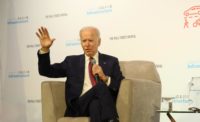Building Trades Tout Legislative Wins on Infrastructure at Conference

Enactment of the Infrastructure Investment and Jobs Act last year was the recurring theme for speakers at the building trades 2022 legislative conference, as political and union leaders listed benefits to craft workers in recent legislation and federal-level policies, even as they stressed need to further expand that workforce.
“The level of work that we’re creating, even just the sheer amount of it, is going to test and strain the capacity of our building and construction workforce,” said U.S. Secretary of Transportation Pete Buttigieg at the conference held in Washington, D.C., April 5 to 6. “We cannot afford to leave any talent on the table.”
That effort, stressed by speaker after speaker, would require expanding the pool of applicants for industry jobs—more people of color, women, veterans and those formerly incarcerated. People from “every walk of life and every background,” was how Buttigieg couched it. Sen. Lisa Murkowski (R-Alaska) talked about “reaching out to our young people” about buiding trades jobs as early as middle school.
Childcare programs and related financial assistance were touted as necessary to increase the number of tradeswomen. “If you capped childcare, as I have proposed, at 7 percent of a family’s income making less than 125 grand a year, it could cut in half the costs of childcare, saving thousands of dollars and freeing so many people to be able to go back to work, particularly these women who are totally qualified but have no alternative but to stay home," said President Joe Biden, referencing a plan that is part of the stalled Build Back Better Act.
NABTU President Sean McGarvey pointed to apprenticeship readiness programs, a precursor to registered apprentice programs, as a path to a more diverse workforce. “Of the thousands of ... graduates in the last five years, 80 percent are people of color, and 25 percent are women.”
Calling registered apprenticeships “the model created by the building trades [and a] gold standard for job training in this country,” U.S. Labor Secretary Marty Walsh, a former building trades regional executive, said the administration was “doubling down” on the program and applying it to other industries.
Speaker messages that the expansion of the middle class was linked to the strength of unions and union jobs also touched on President Biden's Feb. 4 executive order mandating project labor agreements on federal construction projects greater than $35 million. The federal government aimed to ensure the infrastructure bill “creates not only jobs but careers," said Buttigieg, "and not only a paycheck but generational wealth across rural, suburban and urban communities for people of every gender and race. He added, “that kind of wealth is built in American families when people get access to the kinds of quality jobs that unions can secure.”
The Biden administration's actions on labor agreement have not drawn universal praise across the industry.
The Associated Builders and Contractors sent a letter to the White House on April 6 signed by more than 1,200 of its 21,000 members opposing the Biden executive order. “We believe that any federal investment in construction, including our nation’s infrastructure, must ensure opportunity to all Americans, regardless of labor affiliation,” the letter said adding that “ABC members, along with many other construction employers, provide well-paying jobs and benefits for their employees.”



